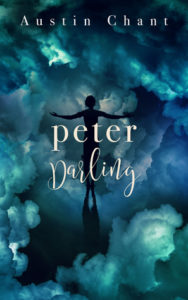Review: Peter Darling by Austin Chant (2017)

“That’s the trick of growing up. Nothing stays the same.” Hook sounded oddly sympathetic. “You see the faults in everything. Including yourself.”
– Peter Darling, Austin Chant
Rating: ★★★★★
Genre: Fantasy, fairy tale, romance
Categories: M/M, trans, enemies to lovers, fairy tale retelling
Content Warnings (highlight to read): Deals with societal & familial transphobia. Some death & violence but not graphic.
Description: A sumptuously gorgeous re-imagining of Peter Pan where the fairies are all the more strange and where Neverland—and your identity—is what you decide to make of it. Enemies-to-lovers Peter & Hook: if this is automatically selling point, great, you won’t be disappointed. If it makes you raise your eyebrows: trust me, the storytelling, characterization & development is so deftly woven that you also won’t be disappointed.
“Ten years ago, Peter Pan left Neverland to grow up, leaving behind his adolescent dreams of boyhood and resigning himself to life as Wendy Darling. Growing up, however, has only made him realize how inescapable his identity as a man is.”
Impression: Oh, this is so lovely. I could read this book a thousand times. I was never the biggest Peter Pan fan, but Peter Darling took so much of what I love about stories and storytelling and the weight of imagination and wove it all together with clever and enjoyable prose. It’s a story about self-identity, about love, and about escapism, and about eventually figuring out what you need to face the real world.
Austin Chant’s Peter is all kinds of impulsively charming, growing more thoughtful as he’s forced to reckon with the feelings and uncertainties he’s trying to outrun. And Hook, oh goodness: he starts off as the shallow archetype, the dastardly villain, the pirate—and is slowly revealed, unwoven, undone and remade into a genuinely compelling and interesting character and a love interest you’re actively rooting for (I was very surprised but overwhelmingly delighted).
The worldbuilding is extremely clever: re-inventing that which needs it within the familiar, nostalgic outlines. The pacing is also a gem, particularly in the way that information is revealed: slowly, starting off with things ‘as expected’ and incrementally starting to pull threads and turn expectations on their heads as the story starts to snowball, then change and transform.
PS: The ending? Very, very satisfying.